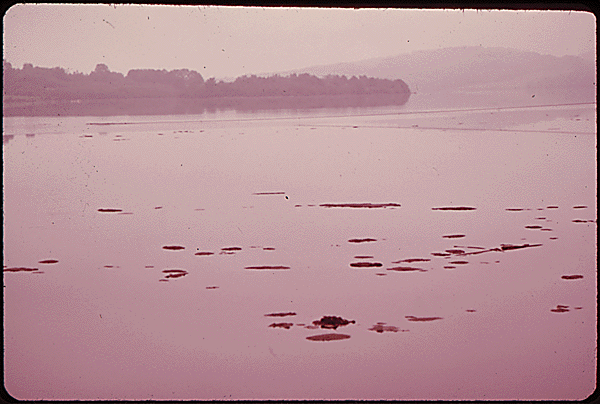Voices from the Past: Nixon, Congress Debate the Clean Water Act
Four decades ago, national leaders talked about our duty and responsibility to cut water pollution–and about its costs.

October 18, 2012 marks 40 years since Congress passed the Clean Water Act, overriding President Richard Nixon’s veto to do so. Next week, Circle of Blue will publish two articles on the effects of the act and its remaining challenges.
I worked some of the act’s history into my article, but I want to use a little more space here to revive the voices of those who debated whether such a monumental legislative step was necessary.
The most famous and most candid assessment of the nation’s waters in the pre-Clean Water Act era came from Time magazine, which proclaimed Ohio’s Cuyahoga River, flowing into Lake Erie through Cleveland, among the worst in the country.
“No Visible Life,” the editorial lamented. “Some river! Chocolate-brown, oily, bubbling with subsurface gases, it oozes rather than flows. ‘Anyone who falls into the Cuyahoga does not drown,’ Cleveland’s citizens joke grimly. ‘He decays.'”
The magazine then lauded the city and its gallows-humored citizens for approving US$100 million in bonds to build a new sewage treatment plant and sewer lines. But these actions, however beneficial for the metropolitan area and the Lake Erie shore, were checked by the nature of rivers, the magazine noted:
“The accomplishment, huge as it is, only fixes the price of optimism. Unfortunately, water pollution knows no political boundaries. The Cuyahoga can be cleaned up in Cleveland, but as long as other cities keep dumping wastes upriver, it will remain exactly what it is today–an open sewer filling Lake Erie with scummy wavelets, sullen reminders that even a great lake can die.”
And that is why Congress stepped in, to create an act with national standards so that those upstream and downstream faced the same obligations.
How Much to Spend?
President Nixon praised the intent of the bill that Congress sent him, but he recoiled against what he called the “needless overspending” that the representatives stuffed in it: reimbursements to state and local governments for sewage treatment works already completed and an increase in the federal share of spending for new works from 55 percent to 75 percent.
Nixon argued in his veto message:
“Every environmental spending increase that I have proposed, however, has been within the strict discipline of a responsible fiscal policy–a policy which recognizes as the highest national priority the need to protect the working men and women of America against tax increases and renewed inflation. Specifically, the water pollution control bill which I originally sent to the Congress last year was fully consistent with the concept of a balanced, full-employment budget. It would have committed $6 billion in Federal funds over a three-year period, enough to continue and accelerate the momentum toward that high standard of cleanliness which all of us want in America’s waters.
By contrast, the bill which has now come to my desk would provide for the commitment of a staggering, budget wrecking $24 billion. Every extra dollar which S. 2770 contemplates spending beyond the level of my budget proposals would exact a price from the consumer in the form of inflated living costs, or from the taxpayer in the form of a new Federal tax bite, or both.”
So on October 17, 1972 he sent it back to Congress, which was controlled by the Democrats, who held both the Senate and the House.
Congress Responds
In the Senate that same October day, Maine Democrat Edmund Muskie, the bill’s sponsor, rallied his colleagues by appealing to their sense of duty. (The full text of the Senate debate can be found here.)
“When we pass a piece of legislation like this,” Muskie said, “with its requirements imposed on industry, with its requirements imposed on the States, with its requirements imposed on the local governments, the question that faces us then is, as we impose this commitment on them, what commitment are we prepared to accept on the part of the Federal Government?”
Support for the act came from both sides of the aisle. Senator Howard Baker, a first-term Republican from Tennessee who would later earn the sobriquet the “Great Conciliator,” wrote that the legislation was the result of bipartisan cooperation:
“There are many, many Federal programs that are wasteful, and many American tax dollars are idly spent on programs that do not produce commensurate results. But that is not true of the Federal pollution effort. I have spent more time, as an individual Senator, on environmental legislation than on any other field of endeavor since coming to the Congress in 1967.
I believe that the Federal Water Pollution Control Act Amendments of 1972 is far and away the most significant and promising piece of environmental legislation ever enacted by the Congress.”
Muskie’s concluding statement, his cri de coeur for national responsibility and prudent use of natural resources, deserves a full citation:
“It seems to me, Mr. President, and I think most Members will agree, that we have reached a point in our struggle against water pollution where–as we say in New England–we must either ‘fish or cut bait.’ If we are serious about restoring the quality of our Nation’s waters to a level that will support life in the future, then we ought to be prepared to make some sacrifices in that effort now. If we are not serious, then let us bury our heads in the sand, sustain the President’s veto, and count on some unlikely providence to save us from ourselves.
This bill does not discriminate against Republicans or Democrats, industrial or municipal polluters, small businesses or conglomerates, private citizens or public officials. It simply says to everybody: We have no choice. Water pollution must stop. And here is a uniform, effective law to make sure that it does.
Let us close ranks, Mr. President, override this veto, and approve this bill one last time–so that we can take home to our constituents this week the realistic hope for a clean environment; so that we can leave to our children rivers and lakes and streams that are at least as clean as we found them, and so that we can begin to repay the debt we owe to the water that has sustained our Nation.”
In the end, both the House and the Senate voted to override Nixon’s veto. But the president, true to his word, used his power of impoundment to prevent half the money authorized by the CWA from being spent. The Supreme Court later curtailed this presidential power.
Jump ahead to the present, and money is still one of the major obstacles for clean water. Cities and towns, feeling the pinch of economic recession, say they need more financial help to meet Clean Water Act mandates. Congress, in an austere mood, seems loath to expand any federal spending programs. Cheaper, greener methods are being tested, but they do not cancel the need to repair and maintain existing infrastructure.
We know how our antecedents responded, yet the water pollution problems today are of a different type and magnitude. What the current crop of leaders will do about them remains to be written.
Brett Walton
Circle of Blue reporter
Brett writes about agriculture, energy, infrastructure, and the politics and economics of water in the United States. He also writes the Federal Water Tap, Circle of Blue’s weekly digest of U.S. government water news. He is the winner of two Society of Environmental Journalists reporting awards, one of the top honors in American environmental journalism: first place for explanatory reporting for a series on septic system pollution in the United States(2016) and third place for beat reporting in a small market (2014). He received the Sierra Club’s Distinguished Service Award in 2018. Brett lives in Seattle, where he hikes the mountains and bakes pies. Contact Brett Walton








Leave a Reply
Want to join the discussion?Feel free to contribute!